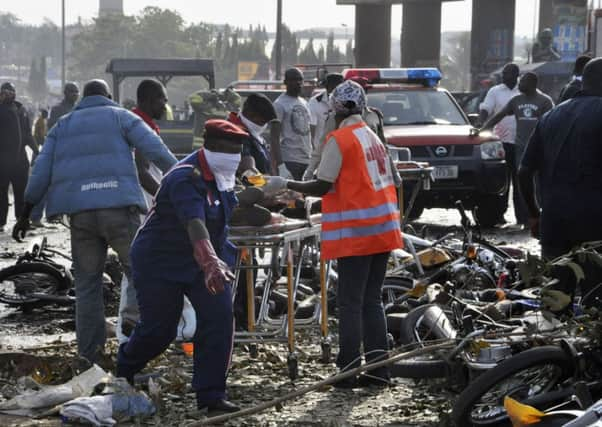Nigeria: 71 killed and 124 wounded in bus blast


The deadly attack on Abuja has raised concerns about the spread of an Islamist insurgency.
The blast destroyed a number of buildings and dozens of coaches and minibuses, a police spokesman said.
Advertisement
Hide AdAdvertisement
Hide AdThere was thought to have been one blast, followed by secondary explosions as vehicle fuel tanks ignited and burned.
Rescue workers and police helped the wounded before they were taken by ambulance to hospitals.
No organisation has claimed responsibility for the rush-hour blast, though the Boko Haram terrorist network has been threatening to attack the capital.
The Islamic extremists, based in north-east Nigeria, carried out a 2011 suicide car bombing at the United Nations office building in Abuja which killed at least 21 people.
Security experts suspect the explosion came from a vehicle, said Air Commodore Charles Otegbade, director of search and rescue operations.
The bus station, five miles south-west of central Abuja, serves Nyanya, a poor, ethnically and religiously mixed satellite town from which many residents commute to work in the city.
“I was waiting to get on a bus when I heard a deafening explosion, then saw smoke,” said Mimi Daniels, who escaped from the blast with minor injuries to her arm.
“People were running around in panic.”
Security forces struggled to hold back a crowd of onlookers and fire crews hosed down a bus still holding the charred bodies of commuters.
Advertisement
Hide AdAdvertisement
Hide AdEyewitness Badamasi Nyanya said he had seen 40 bodies being moved from the scene. The blast ripped a hole 4ft deep in the ground of Nyanya Motor Park, he said. Other eyewitnesses said they saw rescue workers and police gathering body parts.
“These are the remains of my friend,” said a man who gave his name as John. He held up a bloodied shirt. “His travel ticket with his name on was in the shirt pocket.”
The attack underscores the vulnerability of Nigeria’s federal capital, built in the 1980s in the geographic centre of the country to replace the coastal city of Lagos as the seat of government for what is now Africa’s biggest economy and top oil producer.
Boko Haram militants fighting for an Islamic state have largely been confined to the country’s remote north-east.
They have been particularly active there over the past few months and are increasingly targeting civilians they accuse of collaborating with the government or security forces.
Kole Shettima, director of the Abuja office of US charitable institution the MacArthur Foundation, said: “In some ways it’s not a big surprise. The situation has been escalating. It’s a statement that they are still around and they can attack Abuja when they want, and instill fear.”
There had been no such violence near the capital since suicide car bombers targeted the offices of the newspaper This Day in Abuja and the northern city of Kaduna in April 2012.
Security forces at the time said that was because a Boko Haram cell in neighbouring Niger state had been broken up.
Advertisement
Hide AdAdvertisement
Hide AdA Christmas Day bombing of a church in Madalla, on the outskirts of Abuja, killed 37 people in 2011, although the main suspect in that attack is now behind bars.
Boko Haram also claimed responsibility for a bomb attack on the UN’s Nigeria headquarters that killed 24 people and killed 60 on 26 August 2011.
Boko Haram, which in the Hausa language of largely Muslim northern Nigeria means broadly “Western education is sinful”, is loosely modelled on the Taleban movement in Afghanistan and has forged ties with al-Qaeda-linked militants in the Sahara.